Before we begin, you may notice some ch-ch-changes around here—Messy Work has a new look, courtesy of the amazing Becky Symes. More on which later…
It’s the most divisive time of the year
Happy New Year! Have you spent the past week furiously journalling, Tarot-ing and Notion-ing your 2025 intentions, like I have?
Or will you throw up if you so much as glimpse the words “fresh start”, “new leaf” or “manifesting” ever again?
The New Year can be quite a weird, polarising time.
Some like to turn January into a challenge, binning their burgers and beers to set the tone for a virtuous year ahead (or a huge piss-up and 3am takeaway on February 1st).
Others, according to a lengthy Reel I watched on Instagram, like to grab their life partner and laptop, and spend New Year’s Day mapping out their goals on thousands of tiny post-it notes on the living room floor, then meticulously documenting them in spreadsheets.
As someone who is usually too hungover on New Year’s Day to entertain such rigour, this made me feel bad—so I’ll keep my opinions about the corporatisation of romantic relationships to myself.
Then, there are those who think 1st January is just another day and post-it notes are futile. Since up to 80% of New Year’s resolutions are abandoned by February, they might just be right.
Now, I also have a lot of opinions on why rigid goal-setting can sometimes lead us astray, especially if you’re already a high achiever (which I may go into in this journalling workshop I’m hosting).
However, when I was digging deep for a hot take on “new year, new me” culture, it struck me that there’s actually a bigger question at play than how we approach change.
Really, whether we achieve our goals or honour our intentions is determined by whether we think change is possible in the first place—and whether or not we deserve it.
The mess
I am an eternal optimist and a transformative coach. Not only do I find the start of a New Year irresistible on a personal level (any excuse to buy new stationery), but it’s also a busy time for me professionally—much like gym memberships, it’s when a lot of people think about getting coaching.
Unsurprisingly, my clients usually come from the furiously-journalling-and-manifesting camp. Because to be willing to invest in coaching, you have to be willing to believe in change. To have faith, or at least a hunch, that there’s more to life than whatever you’re currently experiencing.
My clients come to me feeling stuck. Jaded. Disillusioned. Disappointed. Frustrated. They may have poured blood, sweat, tears and years into getting to where they thought they wanted to be (whether that’s a job, retirement, a relationship, a house, or a salary). But once they’ve got there, it isn’t what they expected. And so they’re wondering, is this it? Or is there more?
Coaching gives them a space to share those frustrations and fears with someone who doesn’t know them well enough to judge them. What I mean by that is that when we voice these kinds of concerns to our friends, relatives or partners, their responses could be shaped by a whole number of factors—their preconceived notions of who we are, their own self-image, their desire to keep us safe—that aren’t always helpful.
So I act as a safe, objective sounding board. Someone to whom they can voice out loud their fledgling ideas, nagging feelings, and wild, wild dreams, perhaps for the first time.
Meeting someone at the precipice of change is always exhilarating and deeply rewarding. However, it’s never a smooth journey. Coaching is not a magic button or an overnight fix, where people come in, say what they want to change, and do it. There’s a crucial step before the action, where they’re required to confront what could get in their way.
I see this a lot in my core coaching programme, Crossroads, which is designed to help people navigate a turning point in their lives and careers, and find a new direction. There’s nearly always a point in our conversations, after we’ve identified exactly what feels “off” about now, reflected on what hasn’t worked out in the past, and explored what could be, when clients ask the same question.
They preface it with an “I don’t know”, eyes dropping to their laps, a shrug of the shoulders:
Am I asking for too much?
I know that voice of doubt all too well, because I’ve had a lot of coaching. I’ve had many moments when I’ve asked myself if all this soul-searching is self-development, or just plain self-indulgent. And if wanting all the things I want is selfish, unrealistic or greedy.
Do we need to just suck it up, accept our limitations and be content with what we’ve got? Or is there more to life?
Make it make sense
The New Year is a vignette of how we typically approach that question: is there more to life?
For some, it’s an enthusiastic “Yes!”, while others carry a fatalistic resignation to their lot—the satisficers vs. the maximisers, if you like. Many of us hover doubtfully in between the two states: one part pulling us towards the unknown, another telling us to just get on with it, or this is as good as it gets.
So which part is right?
I think that humans have a natural inclination towards growth, meaning and fulfilment—evolutionarily speaking, our appetite for self-improvement is how we’ve got this far.
But of course, a huge number of contextual, circumstantial and personal factors can get in the way of that innate drive for betterment.
The enormous caveat to this entire post is that being in a position to ponder if there’s more to life and do something about it depends on whether or not you have your basic needs for shelter, sustenance and safety (physical and psychological) met.
Not everyone is lucky enough to be able to influence or change how they live their life or whether they meet their personal goals—which, I would argue, is all the more reason for those of us who do have that freedom, agency and privilege to make the most of it.
However, for those of us pondering these questions from a relatively healthy, stable and liberated place, there’s one thing that really holds us back: ourselves.
Whenever the “Am I asking for too much?” voice comes up, the first thing to do is listen closely to what it is saying. Because its questions are not unreasonable and its intentions are likely well-meaning: it’s a part that wants to protect us from risk, failure, disappointment, and embarrassment.
Next, we might want to think about where this voice has come from. Because that protective instinct is learned behaviour, acquired in a world that’s always trying to tell us what we should want.
The work
Each of us is a complex little ecosystem of pesky thoughts, unproductive patterns, unhelpful beliefs, and big, deep wounds. On top of that, we live in a big, baffling world that’s constantly feeding us BS about what it means to be happy and successful.
So while everyone’s journey is unique, here are some starting points for answering those two questions: is there more to life? Or are you asking for too much?
1. What’s your definition of “more”?
In a society that’s obsessed with the pursuit of “more”, it’s worth interrogating exactly what it is you are seeking. While there are times when we need to take a long, hard look at ourselves and make some changes, there are also times when we need to unsubscribe from the relentless pursuit of self-optimisation, and learn to just be.
Usually, the “more” my clients are seeking has less to do with material gain or status (e.g. a new job title), and more to do with how they feel—about themselves, others, the world, life. But for recovering high achievers like me, it can be a challenge to deprogramme ourselves from society’s definition of “more”.
We are so used to striving for more money, more seniority, more accomplishments, more clout, more matches on Hinge, that we fail to realise what we really need is more rest, more self-compassion, more ease, more creativity, more authenticity, more integrity, or more joy.
If you’re nodding along to the above, check out this post on anti-girlbossing.
2. Who are you asking?
The concept of “having it all” is a thorny one, particularly for women.
Capitalism and consumerism paint us pretty pictures about what should bring us happiness: the perfect body, the latest handbag, 5-star holidays, an LED face mask. They like to keep us in a fairly stable state of misery and dissatisfaction, because it keeps us earning and spending money.
Then there’s our families. Perhaps they egg us on to find our “happily-ever-after”, regaling us with stories and lectures about marriage, prams and pensions. Sometimes they impose their own wounds and limiting beliefs on our potential and growth.
And then there are the lingering, incongruous vestiges of deep-rooted cultural and religious beliefs. That, despite all the opportunities and face creams being shoved in our faces, convince us that to want is wrong (particularly when it’s wanting pleasure, ease or leisure).
There’s also basic biology to contend with: the reality of ageing bodies and ticking clocks, and all the dilemmas, sacrifices, uncertainty and heartbreak that accompany it.
Whatever the source of our need to ask permission, we can be plagued by feelings of shame and guilt when we dare to ask for more. They usually arise from the gap between what we’ve been told we should want vs. what we actually want. And beneath these beliefs lie deeper wounds that control that narrative around what we do or don’t deserve.
My take
Like I said, I’m an eternal optimist—and perpetual seeker. As I see it, there is always more to life than we can possibly imagine. More to learn. More to love. More to light us up. More to let go of.
I work with clients to unearth all of the thoughts, beliefs, emotions and patterns that drive us below the surface, and what we discover usually surprises us. Sometimes, “more” looks like telling your boss adios or ending a relationship. Other times, that “more” is learning the true source of your dissatisfaction, and realising that actually, everything you need and love is already right in front of you.
This self-discovery helps us better understand ourselves and others, meaning we can create healthier relationships, live by the narratives that serve us, learn to let go of those that don’t, and feel a greater sense of peace and fulfilment.
I don’t think any of that is too much to ask.
So I see that voice as one of caution as we venture into unfamiliar territory—which is an undeniably scary prospect! One of guilt that is bound up in ancient myths around what it means to be “good”. One that comes from the not-good-enough wound that most of us carry.
Sometimes, it can be a voice of good sense: are you taking on too much? Do you need to slow down? After all, you are only human.
The messy work is disentangling all of these ulterior questions and distinct voices. Letting their worries be heard. And liberating yourself from the idea that that it is bad to want more.
What does “more” look like for you?
I’d love to hear your thoughts in the comments.
🍋 Exciting announcement: moretolifecoach.co.uk is here 🍋
Bang on theme (almost like I planned it), I’m doing a bit more this year.
While I’ve spent the past year coaching nearly 30 amazing clients, until now, I haven’t had a proper home or name for my work. So I’m super excited to unveil my new website and share the name of my coaching business, More To Life.
Alongside my work as a writer, I’ll be taking on a limited number of new coaching clients in 2025. So if you feel like there must be more to life, take a look at my signature programmes, Crossroads and Sounding Board, and drop me a message if you’d like to chat.
A huge thank you to my website and brand designer extraordinaire,
, and my photographer, Jolanta Valeniece, for helping me bring More To Life, to life.Here's to a year of more…
About me + Messy Work
If you’re new here, I’m Lucia, a freelance copywriter, accredited career, creativity and life coach, and enthusiastic Substacker.
This newsletter is dedicated to making sense of, moving past and really celebrating the messy work of life—through personal essays, loose guides, evolving ideas, and astute pop culture references.
If you’ve enjoyed this post, please give it a ❤️, share with a mate or hit subscribe.
It’s free, it helps more people discover my work, and it makes me do this:


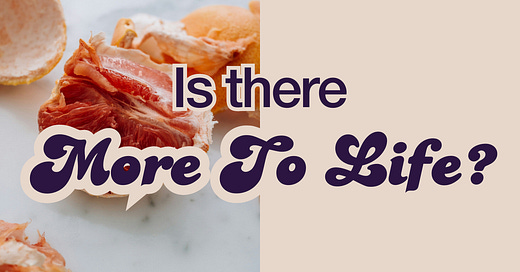



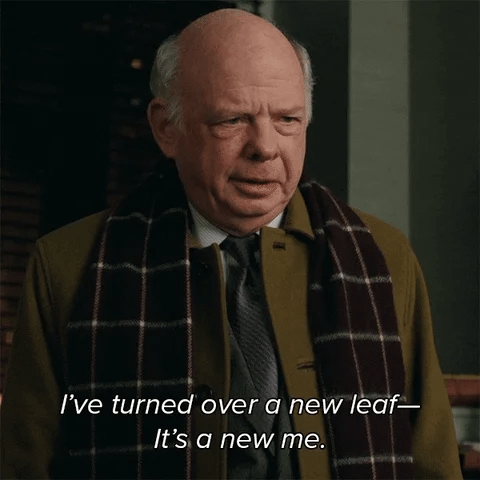

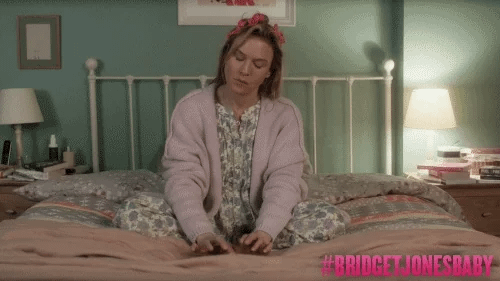
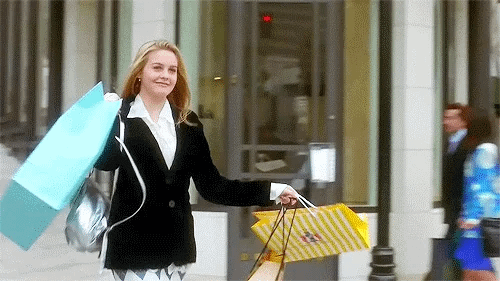
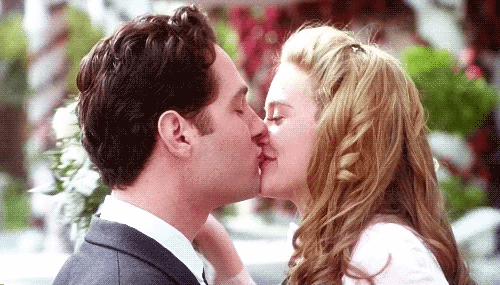


Your words always perfectly articulate the feelings I have but can't locate. The tiktok couple's vision boarding really took me out.
P.S So exciting to see the visuals bring it all to life too!